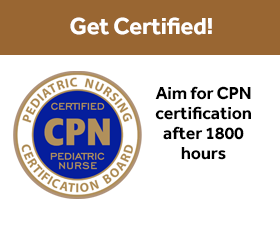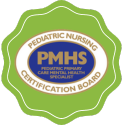Pediatric Nursing Career Pathways
Pediatric nursing offers a variety of career opportunities, but are you familiar with all the rewarding roles and leadership options in this specialty?
Use IPN’s library of career pathways to make a plan for your future... or support other nurses or students in their journey. Give feedback on these resources.
Spark interest in pediatric nursing careers for students with our immersive educator's guide. Use this resource to engage students with clear career steps and interactive classroom activities.
The Pediatric Nursing Certification Board offers a free pediatric RN competency framework, plus a free continuing education activity. An advanced practice framework is coming soon.
Certified Pediatric Nurse: Children aren’t little adults. As a vulnerable population, they need specialized care from RNs with confirmed expertise in pediatrics. Becoming a Certified Pediatric Nurse (CPN) is a professional milestone for RNs in a wide variety of settings and roles who want to demonstrate their knowledge in and commitment to pediatric nursing. Get your plan.
Clinical Nurse Leader: A pediatric clinical nurse leader wants to answer questions like “Is it effective?” and “Is it efficient?” with the end goal of improving health outcomes for children, adolescents, and young adults. They identify gaps in health care, ways to decrease costs, and priorities so they can communicate findings to leaders and implement changes. Get your plan.
Pediatric Nurse Practitioner: A pediatric nurse practitioner (PNP) has graduate level education to provide health care for children, adolescents, and young adults. They work in different settings like hospitals, private practice, or specialty clinics to promote overall health and well-being. Get your plan.
Pediatric Nurse Scientist: Pediatric nurse scientists (or nurse researchers) investigate how to make health care better for kids, families, communities. Sometimes they explore how to better support nurses. Whatever topic they tackle, they use evidence and best practices to transform outcomes. Get your plan.
Educator/Faculty: Academic educators and faculty members bring pediatric nursing practice to life in classrooms and clinical settings. They develop curricula and instruct, evaluate, and advise students to shape future careers. Their goal is to develop well-prepared nurses or advanced practice nurses who are ready to enter the workforce and make a positive impact on child health. Get your plan.
Nurse Entrepreneur: A pediatric nurse entrepreneur is a creative self-starter who translates their clinical expertise into a successful business in the health care industry. They identify needs then create solutions. Developing apps or new medical products, writing, training, or launching a nurse-run health agency are just a few examples. Get your plan.
Pediatric Primary Care Mental Health Specialist: Primary care is often the first place where developmental, behavioral, or mental health conditions surface. Access to specialized care can have long wait times. The Pediatric Primary Care Mental Health Specialist (PMHS) helps ensure that kids get validated help faster for conditions typically seen in primary care like ADHD, anxiety, depression, and more. Get your plan.
Chief Nursing Officer: CNOs lead large teams to elevate care for entire communities. They are strategic thinkers with skills that guide human resource, financial, and technology decisions. This role may also be known as Chief Nurse Executive, Vice President of Patient Care, or similar titles. Get your plan.
Preceptor: A preceptor has the experience, follow-through, and willingness to prepare nursing students for delivering high quality, safe care to patients. Pediatric nurse preceptors guide the journey of the next generation of RNs and advanced practice nurses to ensure success and resilience in their new careers. Get your plan.
Professional Association Leader: Nursing and interdisciplinary professional organizations, membership associations, and societies multiply the power of individual members to impact health care. Pediatric nurses volunteering to lead at the local, state, national, or international level are change agents who use their voice and expertise to influence policies and practice. Get your plan.
Shared Governance Council Member: Pediatric nurses at the bedside can impact entire hospital systems by participating in shared governance councils or committees. Shared decision making with nurse leaders empowers clinical nurses to influence improvements for staff and patients. This example of professional autonomy makes nursing stronger. Get your plan.
School Nurse: School nurses support child health within a school ecosystem. From first aid and health screenings to issues related to physical and emotional health, including growth and development, school nurses make a significant difference. For kids with limited access to health care, school nurses are key in connecting them to primary care. School nurses also provide support to kids with chronic conditions and special healthcare needs, allowing them to access the curriculum optimally. Get your plan.
Clinical Nurse Specialist: A pediatric clinical nurse specialist (CNS) is an advanced practice registered nurse who has graduate level education to provide direct care, diagnoses, and treatment for patients. As leaders in evidence-based practice across the continuum of wellness and illness, CNSs can work in acute care settings such as hospitals, but they also practice in primary care. Get your plan.
Nurse Informaticist: Pediatric nurse informaticists are passionate about how technology results in safe, effective health care for children and smooth workflows for staff. Nurses in this role influence patient care experiences and outcomes by supporting teams who use data, systems, or processes. Through communication, education, and feedback loops, nurse informaticists consult to facilitate improvements, introduce new IT functionality, and more. Get your plan.
Nurse Manager: Nurse managers play a crucial leadership role in healthcare settings, overseeing the delivery of patient care and ensuring that nursing teams operate efficiently and effectively. They supervise nursing teams, ensure that patients receive safe, high-quality care, and manage department budget and resources. While nurse managers function in a leadership role, they often have extensive interactions with patients and families. Get your plan.
Quality Improvement / Safety Nurse: A quality nurse focuses on improving quality and safety of care in health systems. They use outcome data to identify clinical areas that need improvement, then identify gaps in processes or behaviors that can be addressed by leading teamwork to achieve clinical excellence. They use evidence-based practice, principles of patient-centered care, and
science-supported improvement processes to provide innovative pathways to enhance patient safety and care outcomes. Get your plan.
Pediatric Nursing Director: Ready to lead at the highest level of pediatric nursing? Becoming a Pediatric Nursing Director is a rewarding next step for experienced pediatric nurses who are passionate about improving systems, mentoring others, and shaping the future of child health. In this leadership role, you'll drive clinical excellence, guide policy and practice, and support the well-being of both patients and staff. Get your plan.
Nurse Consultant: As a Nurse Consultant, you’ll use your pediatric knowledge and experience to advise healthcare organizations, legal teams, businesses, government agencies, or other entities seeking nursing expertise. Whether you’re improving patient outcomes, analyzing medical data, giving a deposition, or shaping policy, this role lets you lead with insight and influence systems at a high level. Get your plan.
Professional Development Specialist: In this role, you’ll apply your clinical knowledge and expertise in nursing education and program planning to promote the pediatric nursing professional role competence and growth within various practice settings. According to the National Professional Development (NPD) practice model you will work with both new and experienced nursing professionals as a learning facilitator, change agent, champion for inquiry, leader, mentor, partner for practice transitions, as well as an advocate for the NPD specialty. The ultimate goal of this role is to make sure all pediatric nurses have knowledge of current evidence-based practice and the tools to implement that practice to provide optimal care for the populations they serve. Get your plan.
Clinical Nurse Educator: Pediatric Clinical Nurse Educators are highly skilled and experienced nurses who lead the professional development of nurses and other healthcare team members by developing and implementing evidenced-based educational programs and resources. Clinical Nurse Educators have a strong clinical background and in-depth knowledge of the latest research and best practices in pediatric nursing. Get your plan.
Charge Nurse: Are you a Pediatric RN with a few years of experience who is interested in leadership? Becoming a Charge Nurse is a great opportunity to take your nursing career to the next step. Charge nurses oversee and coordinate the daily operations of a department and staff during a shift ensuring provision of safe and effective care. Get your plan.
Transition to Practice Program Coordinator: As a Transition to Practice Program Coordinator, you will be responsible for overseeing all aspects of the nurse residency program. These can include strategic planning, recruitment, development of an evidence-based nursing curriculum, placement of nurse residents or fellows with appropriate preceptors, as well as communicating and collaborating with relevant stakeholders. The coordinator also ensures that the program achieves measurable outcomes. Get your plan.







